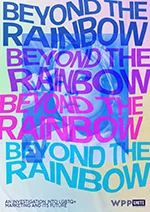 |
| Ben Finzel |
It’s Pride Month in America. There are rainbows seemingly everywhere. The LGBTQ community is hosting parades, parties and special events. And an ever-larger number of companies and organizations are using this opportunity to proclaim how LGBTQ-friendly or supportive they are as they sponsor and participate in many of these events.
Pride is a celebration, yes, but it started as a protest. And despite the need we all have for a little joy and happiness right now, this remains a challenging time to be an LGBTQ person or an LGBTQ ally.
More than 200 laws have been proposed across the country to block, limit or take back rights from LGBTQ people. Transgender people are being attacked in state houses and city halls, not to mention in the streets. The Supreme Court is reportedly planning to roll back not just Roe v. Wade, but one (or more?) of the legal underpinnings of recent LGBTQ legal decisions such as equal marriage. In 29 states, LGBTQ people can be denied access to public services—in 2022!
And as if that weren’t enough, at least some of those companies and organizations professing to be our “friends and supporters” while they “celebrate” Pride Month are writing checks to politicians and political groups that would deny our humanity by rolling back rights we have just won. Others would deny our existence by supporting “Don’t Say Gay” bills or deny us healthcare simply because of who we are. Adweek highlighted a few of these companies in a recent story, but there are more.
So, what’s a responsible, ethical company or organization to do? How can communicators help the organizations they work with meet the needs and expectations of LGBTQ audiences?
Here’s a starting point: We look for companies and organizations that want to authentically engage with us and that consistently demonstrate that through their words and deeds.
What does that mean?
- Don’t pander to us.
- Don’t assume that putting a rainbow in your logo is enough for us to believe you’re committed to real engagement.
- Don’t tell us you care about our communities and then support those who don’t.
- Don’t hire us, pay us and promote us less than you do others.
- Don’t hire non-LGBTQ firms to manage your LGBTQ outreach and engagement.
And what should you do to be effective and authentic?
- Check your own policies and procedures to make sure your LGBTQ employees are given the same opportunities and benefits as other employees (this applies to all marginalized communities—we’re all in this together).
- Consider why you want to engage LGBTQ audiences: are you just interested in our spending power or in developing an ongoing relationship with our community?
- Identify who in your company or organization can engage with LGBTQ audiences: Do you have LGBTQ people in positions of authority who can represent you? If not, do the people who represent you know how to engage us respectfully?
- Determine what you can say about your company or organization that will be both authentic to you and interesting/relevant to LGBTQ audiences: We want to know that you care and that you understand and respect us.
- Commit to a long-term program that will last beyond Pride Month and that will be part of your overall public engagement, not just a small effort that is only spotlighted once a year during Pride Month.
This list isn’t exhaustive, but it’s a good place to start. We want your support and involvement with our community, but we also want you to mean it. Pride is about respect: we give it when we get it.
***
Ben Finzel is president of RENEWPR in Washington, D.C, an NGLCC-certified LGBT Business Enterprise he founded in 2015. In 2003, he co-founded FH Out Front at FleishmanHillard, the first global LGBTQ communications practice at an international PR firm. In 2018, he founded DC Family Communicators, a professional networking group for LGBTQ communicators in Washington, D.C. In 2019, he co-founded The Change Agencies, the first national network of multicultural and LGBTQ-owned and operated PR firms.


 LGBTQ+ representation in communications is getting better, but many brands are still lagging when it comes to making a year-round commitment, according to a report from WPP Unite.
LGBTQ+ representation in communications is getting better, but many brands are still lagging when it comes to making a year-round commitment, according to a report from WPP Unite. To effectively connect with the LGBTQ+ community, agencies need to build cultures that create equity-minded teams and bring that mindset to the work they deliver for clients.
To effectively connect with the LGBTQ+ community, agencies need to build cultures that create equity-minded teams and bring that mindset to the work they deliver for clients.  Being your authentic self might come with some risks, but it can also spur careers and brands to greater success.
Being your authentic self might come with some risks, but it can also spur careers and brands to greater success. There are ways that we as communicators can work to prevent backsliding on the deeply important issue of LGBTQ+ rights. Here are five of them.
There are ways that we as communicators can work to prevent backsliding on the deeply important issue of LGBTQ+ rights. Here are five of them. The economic comeback from the COVID-19 pandemic will likely be led by the LGBTQ consumer.
The economic comeback from the COVID-19 pandemic will likely be led by the LGBTQ consumer.


 Have a comment? Send it to
Have a comment? Send it to 
No comments have been submitted for this story yet.